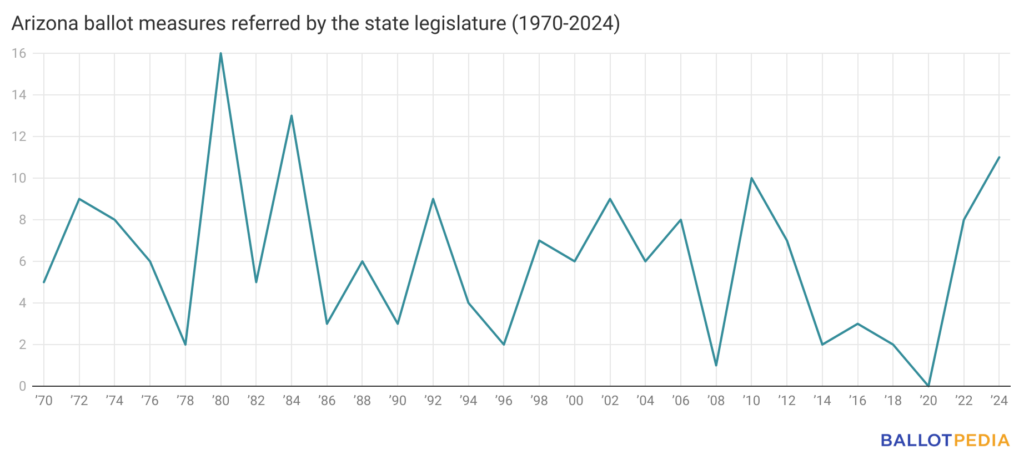The Arizona State Legislature adjourned on June 15, 2024, and referred 11 measures to the ballot—five state statutes and six constitutional amendments. This is the most legislatively referred measures on the ballot since 1984, when 13 measures were on the ballot, and the third-highest year on record in the state.
Some measures did not make the ballot—an additional 15 amendments and five statutes passed one chamber, but not the other.
Arizona has a divided government. Gov. Katie Hobbs (D) was elected in 2022 and took office in 2023, the first time since 2008 that Arizona had a Democratic governor. Meanwhile, the Republican Party controls both chambers of the legislature.

In Arizona, the most legislative referrals were on the ballot in 1980, when 16 measures were referred by the legislature. In 1980, Arizona had a Democratic governor, and the Republican Party controlled both legislative chambers. In 1984, the second-largest number of referred measures were on the ballot. Arizona had a divided government in 1984, with a Democratic governor and a Republican-controlled legislature. This year, 2024, has the third largest number of referred measures.
In all three years—1980, 1984, and 2024—Arizona had a divided government with a Democratic governor and a Republican-controlled legislature.

In Arizona, a simple majority vote in both chambers of the legislature is needed to refer an amendment or statute to the ballot. Constitutional amendments and referred statutes do not require a governor’s signature for approval.
As the governor cannot veto referred measures, including statutes, legislators may choose to send a law to voters to decide, rather than to the governor's desk.
For example, in March 2024, Gov. Hobbs vetoed a bill that would have made crossing the border without authorization a misdemeanor state crime. The state legislature drafted and approved a new proposal that included provisions from the vetoed bill. This time, instead of sending it to Gov. Hobbs, legislators sent it to the ballot. State Sen. Janae Shamp (R-29), who sponsored the vetoed bill, said, "I'm proud that we're including much of that language in the Secure the Border Act, so that we can send this to the ballot to the citizens — we the people."
Like Arizona, Wisconsin has a Democratic governor and a Republican-controlled state legislature. Between 2011 and 2018, when there was a Republican trifecta, there was an average of 0.4 measures on the ballot each year, with no more than 1 measure on the ballot each year. Between 2019 and 2024, with a Democratic governor and Republican legislature, there was an average of 1.5 measures on the ballot per year, with 3 measures on the ballot in 2023 and five measures on the ballot this year in 2024. Two measures were approved on April 2, with two measures on the ballot on Aug. 13, and one measure on the ballot on Nov. 5.
In Arizona, while there are currently 11 measures on the ballot referred by the legislature, the number of measures on the ballot may increase with citizen initiatives. For citizen-initiated measures to be on the ballot, enough valid signatures must be submitted by July 3, 2024.
The following are the legislatively referred measures on the 2024 Arizona ballot.
- Legal Challenge to Initiative Amendment: Would provide for challenges to an initiative measure or constitutional amendment after the filing of the measure with the secretary of state
- Criminal Conviction Fee for First Responder Death Financial Benefit Measure: Would establish a $20 fee on every conviction for a criminal offense, which would go to pay a benefit of $250,000 to the family of a first responder who is killed in the line of duty
- Emergency Declarations Amendment: Would provide for the legislature to terminate a state of emergency or alter the emergency powers of the governor during the state of emergency
- End Term Limits and Retention Elections for Supreme Court Justices and Superior Court Judges Amendment: Would end term limits for state supreme court justices and superior court judges, replacing them with terms of good behavior, unless decided otherwise by a judicial review commission, and would end retention elections at the end of the judicial term
- Immigration and Border Law Enforcement Measure: Would allow for state and local police to arrest noncitizens who cross the border unlawfully, allow for state judges to order deportations, require the use of the e-verify program for some public governmental programs and employment eligibility purposes, and make the sale of fentanyl a Class 2 felony if a person knowingly sells fentanyl resulting in the death of another person
- Legislative Ratification of Rules that Increase Regulatory Costs Measure: Would prohibit a proposed rule from becoming effective if that rule is estimated to increase regulatory costs by more than $500,000 within five years after implementation, until the legislature enacts legislation ratifying the proposed rule
- Life Imprisonment for Sex Trafficking of a Child Measure: Would provide for life imprisonment for an individual who is convicted of sex trafficking of a child
- Property Tax Refund for Non-Enforcement of Public Nuisance Laws Measure: Would allow for property owners to apply for a property tax refund in certain circumstances, including in instances if the city or locality in which the property is located does not enforce laws regarding illegal camping, loitering, obstructing public thoroughfares, panhandling, public urination or defecation, public consumption of alcoholic beverages, and possession or use of illegal substances
- Require Partisan Primaries and Prohibit Primaries Where Candidates Compete Regardless of Party Affiliation Amendment: Would require partisan primaries for partisan offices, meaning that members of political parties nominate their own candidates at primaries for general elections
- Signature Distribution Requirement for Initiatives Amendment: Would create a signature distribution requirement for citizen-initiated ballot measures based on state legislative districts
- Wages for Tipped Workers Amendment: Would allow for tipped workers to be paid 25% less per hour than the minimum wage if any tips received by the employee were not less than the minimum wage plus $2 for all hours worked
Additional reading:



